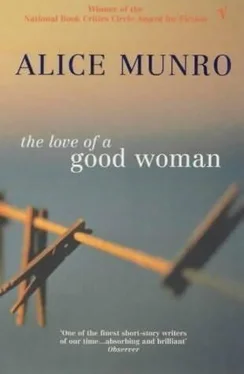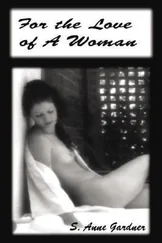Alice Munro - The Love Of A Good Woman
Здесь есть возможность читать онлайн «Alice Munro - The Love Of A Good Woman» весь текст электронной книги совершенно бесплатно (целиком полную версию без сокращений). В некоторых случаях можно слушать аудио, скачать через торрент в формате fb2 и присутствует краткое содержание. Жанр: Современная проза, на английском языке. Описание произведения, (предисловие) а так же отзывы посетителей доступны на портале библиотеки ЛибКат.
- Название:The Love Of A Good Woman
- Автор:
- Жанр:
- Год:неизвестен
- ISBN:нет данных
- Рейтинг книги:4 / 5. Голосов: 1
-
Избранное:Добавить в избранное
- Отзывы:
-
Ваша оценка:
- 80
- 1
- 2
- 3
- 4
- 5
The Love Of A Good Woman: краткое содержание, описание и аннотация
Предлагаем к чтению аннотацию, описание, краткое содержание или предисловие (зависит от того, что написал сам автор книги «The Love Of A Good Woman»). Если вы не нашли необходимую информацию о книге — напишите в комментариях, мы постараемся отыскать её.
The Love Of A Good Woman — читать онлайн бесплатно полную книгу (весь текст) целиком
Ниже представлен текст книги, разбитый по страницам. Система сохранения места последней прочитанной страницы, позволяет с удобством читать онлайн бесплатно книгу «The Love Of A Good Woman», без необходимости каждый раз заново искать на чём Вы остановились. Поставьте закладку, и сможете в любой момент перейти на страницу, на которой закончили чтение.
Интервал:
Закладка:
“I wasn’t sure anybody would be here,” Enid said. “I thought you might still be at the barn.”
Rupert said, “They all pitched in with the chores.”
She could smell whiskey when he spoke, but he didn’t sound drunk.
“I thought you were one of the women come back to collect something you forgot,” he said.
Enid said, “I didn’t forget anything. I was just wondering, how are the children?”
“They’re fine. They’re at Olive’s.”
It seemed uncertain whether he was going to ask her in. It was bewilderment that stopped him, not hostility. She had not prepared herself for this first awkward part of the conversation. So that she wouldn’t have to look at him, she looked around at the sky.
“You can feel the evenings getting shorter,” she said. “Even if it isn’t a month since the longest day.”
“That’s true,” said Rupert. Now he opened the door and stood aside and she went in. On the table was a cup without a saucer. She sat down at the opposite side of the table from where he had been sitting. She was wearing a dark-green silk-crepe dress and suede shoes to match. When she put these things on she had thought how this might be the last time that she would dress herself and the last clothes she would ever wear. She had done her hair up in a French braid and powdered her face. Her care, her vanity, seemed foolish but were necessary to her. She had been awake now three nights in a row, awake every minute, and she had not been able to eat, even to fool her mother.
“Was it specially difficult this time?” her mother had said. She hated discussion of illness or deathbeds, and the fact that she had brought herself to ask this meant that Enid’s upset was obvious.
“Was it the children you’d got fond of?” she said. “The poor little monkeys.”
Enid said it was just the problem of settling down after a long case, and a hopeless case of course had its own strain. She did not go out of her mother’s house in the daytime, but she did go for walks at night, when she could be sure of not meeting anybody and having to talk. She had found herself walking past the walls of the county jail. She knew there was a prison yard behind those walls where hangings had once taken place. But not for years and years. They must do it in some large central prison now, when they had to do it. And it was a long time since anybody from this community had committed a sufficiently serious crime.
Sitting across the table from Rupert, facing the door of Mrs. Quinn’s room, she had almost forgotten her excuse, lost track of the way things were to go. She felt her purse in her lap, the weight of her camera in it-that reminded her.
“There is one thing I’d like to ask you,” she said. “I thought I might as well now, because I wouldn’t get another chance.”
Rupert said, “What’s that?”
“I know you’ve got a rowboat. So I wanted to ask you to row me out to the middle of the river. And I could get a picture. I’d like to get a picture of the riverbank. It’s beautiful there, the willow trees along the bank.”
“All right,” said Rupert, with the careful lack of surprise that country people will show, regarding the frivolity-the rudeness, even-of visitors.
That was what she was now-a visitor.
Her plan was to wait until they got out to the middle of the river, then to tell him that she could not swim. First ask him how deep he thought the water would be there-and he would surely say, after all the rain they had been having, that it might be seven or eight, or even ten, feet. Then tell him that she could not swim. And that would not be a lie. She had grown up in Walley, on the lake, she had played on the beach every summer of her childhood, she was a strong girl and good at games, but she was frightened of the water, and no coaxing or demonstrating or shaming had ever worked with her-she had not learned to swim.
He would only have to give her a shove with one of the oars and topple her into the water and let her sink. Then leave the boat out on the water and swim to shore, change his clothes, and say that he had come in from the barn or from a walk and found the car there, and where was she? Even the camera if found would make it more plausible. She had taken the boat out to get a picture, then somehow fallen into the river.
Once he understood his advantage, she would tell him. She would ask, Is it true?
If it was not true, he would hate her for asking. If it was true- and didn’t she believe all the time that it was true?-he would hate her in another, more dangerous way. Even if she said at once- and meant it, she would mean it-that she was never going to tell.
She would speak very quietly all the time, remembering how voices carry out on the water on a summer evening.
I am not going to tell, but you are. You can’t live on with that kind of secret.
You cannot live in the world with such a burden. You will not be able to stand your life.
If she had got so far, and he had neither denied what she said nor pushed her into the river, Enid would know that she had won the gamble. It would take some more talking, more absolutely firm but quiet persuasion, to bring him to the point where he would start to row back to shore.
Or, lost, he would say, What will I do? and she would take him one step at a time, saying first, Row back.
The first step in a long, dreadful journey. She would tell him every step and she would stay with him for as many of them as she could. Tie up the boat now. Walk up the bank. Walk through the meadow. Open the gate. She would walk behind him or in front, whichever seemed better to him. Across the yard and up the porch and into the kitchen.
They will say goodbye and get into their separate cars and then it will be his business where he goes. And she will not phone the Police Office the next day. She will wait and they will phone her and she will go to see him in jail. Every day, or as often as they will let her, she will sit and talk to him in jail, and she will write him letters as well. If they take him to another jail she will go there; even if she is allowed to see him only once a month she will be close by. And in court-yes, every day in court, she will be sitting where he can see her.
She does not think anyone would get a death sentence for this sort of murder, which was in a way accidental, and was surely a crime of passion, but the shadow is there, to sober her when she feels that these pictures of devotion, of a bond that is like love but beyond love, are becoming indecent.
Now it has started. With her asking to be taken on the river, her excuse of the picture. Both she and Rupert are standing up, and she is facing the door of the sickroom-now again the front room-which is shut.
She says a foolish thing.
“Are the quilts taken down off the windows? “
He doesn’t seem to know for a minute what she is talking about. Then he says, “The quilts. Yes. I think it was Olive took them down. In there was where we had the funeral.”
“I was only thinking. The sun would fade them.”
He opens the door and she comes around the table and they stand looking into the room. He says, “You can go in if you like. It’s all right. Come in.”
The bed is gone, of course. The furniture is pushed back against the walls. The middle of the room, where they would have set up the chairs for the funeral, is bare. So is the space in between the north windows-that must have been where they put the coffin. The table where Enid was used to setting the basin, and laying out cloths, cotton wool, spoons, medicine, is jammed into a corner and has a bouquet of delphiniums sitting on it. The tall windows still hold plenty of daylight.
“Lies” is the word that Enid can hear now, out of all the words that Mrs. Quinn said in that room. Lies. I bet it’s all lies.
Читать дальшеИнтервал:
Закладка:
Похожие книги на «The Love Of A Good Woman»
Представляем Вашему вниманию похожие книги на «The Love Of A Good Woman» списком для выбора. Мы отобрали схожую по названию и смыслу литературу в надежде предоставить читателям больше вариантов отыскать новые, интересные, ещё непрочитанные произведения.
Обсуждение, отзывы о книге «The Love Of A Good Woman» и просто собственные мнения читателей. Оставьте ваши комментарии, напишите, что Вы думаете о произведении, его смысле или главных героях. Укажите что конкретно понравилось, а что нет, и почему Вы так считаете.












